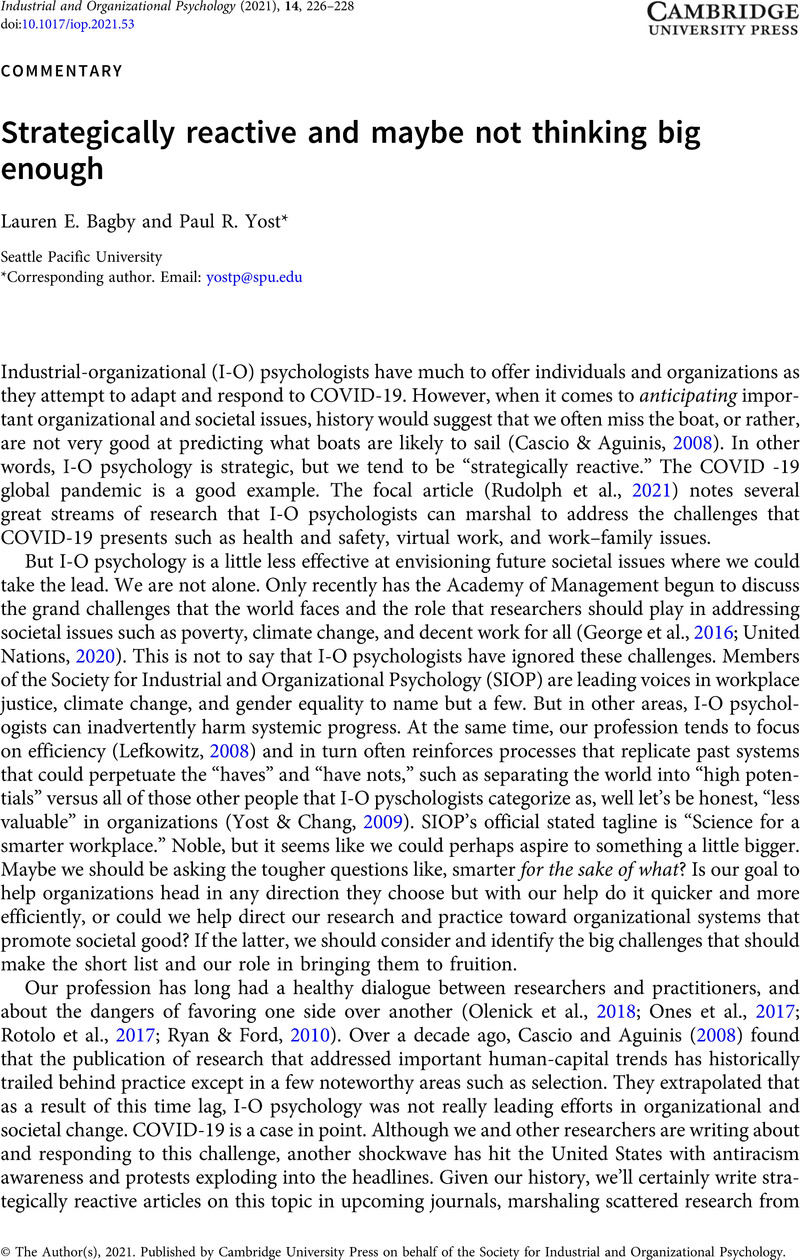No CrossRef data available.
Article contents
Strategically reactive and maybe not thinking big enough
Published online by Cambridge University Press: 24 May 2021
Abstract
An abstract is not available for this content so a preview has been provided. Please use the Get access link above for information on how to access this content.

- Type
- Commentaries
- Information
- Industrial and Organizational Psychology , Volume 14 , Special Issue 1-2: Special Pandemic Issue , June 2021 , pp. 226 - 228
- Copyright
- © The Author(s), 2021. Published by Cambridge University Press on behalf of the Society for Industrial and Organizational Psychology.
References
Cascio, W. F., & Aguinis, H. (2008). Research in industrial and organizational psychology from 1963 to 2007: Changes, choices, and trends. Journal of Applied Psychology, 93(3), 1062–1081.CrossRefGoogle ScholarPubMed
George, G., Howard-Grenville, J., Joshi, A., & Tihanyi, L. (2016). Understanding and tackling societal grand challenges through management research. Academy of Management Journal, 59(6), 1880–1895.CrossRefGoogle Scholar
Lefkowitz, J. (2008). To prosper, organizational psychology should … expand the values of organizational psychology to match the quality of its ethics. Journal of Organizational Behavior, 29(4), 439–453.CrossRefGoogle Scholar
Olenick, J., Walker, R., Bradburn, J., & DeShon, R. P. (2018). A systems view of the scientist–practitioner gap. Industrial and Organizational Psychology: Perspectives in Science and Practice, 11, 220–227.CrossRefGoogle Scholar
Ones, D. S., Viswesvaran, C., & Schmidt, F. L. (2017). Realizing the full potential of psychometric meta-analysis for a cumulative science and practice of human resource management. Human Resource Management Review, 27, 201–215.CrossRefGoogle Scholar
Rotolo, C. T., Church, A. H., Adler, S., Colquitt, A. L., Shull, A. C., Paul, K. B., & Foster, G. (2017). Putting an end to bad talent management: A call to action for the field of I-O psychology. Industrial and Organizational Psychology: Perspectives on Science and Practice, 11, 176–219.CrossRefGoogle Scholar
Rudolph, C. W., Allan, B., Clark, M., Hertel, G., Hirschi, A., Kunze, F., Shockley, K., Shoss, M., Sonnentag, S., & Zacher, H. (2021). Pandemics: Implications for research and practice in industrial and organizational psychology. Industrial and Organizational Psychology: Perspectives in Science and Practice, 14(1), 1–35.Google Scholar
Ryan, A. M., & Ford, K. (2010). Organizational psychology and the tipping point of professional identity. Industrial and Organizational Psychology, 3, 241–258.Google Scholar
Schoemaker, P. J. (1995). Scenario planning: A tool for strategic thinking. Sloan Management Review, 36(2), 25–50.Google Scholar
Schwartz, P. (1996). The art of the longview: Planning for the future in an uncertain world. Doubleday.Google Scholar
United Nations. (2020). Transforming our world: The 2030 Agenda for Sustainable Development. https://sdgs.un.org/2030agenda
Google Scholar
Yost, P. R., & Chang, G. (2009). Everyone is equal, but some are more equal than others. Industrial and Organizational Psychology: Perspectives on Science and Practice, 2(4), 442–445.CrossRefGoogle Scholar


